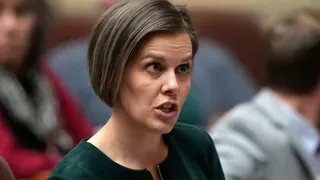February 5, 2009
Lesbian Herstory Archives turns 35
Winnie McCroy READ TIME: 2 MIN.
One of the country's oldest lesbian institutions recently celebrated its emerald anniversary.
The Lesbian Herstory Archives marked the milestone with a party at the LGBT Community Center in lower Manhattan on Jan. 31. Co-founder Joan Nestle served as mistress of ceremonies at the festive event that featured music by Isle of Klezbos, poetry and performances.
The party kicked-off a series of events throughout the year to commemorate the archives and the history it has preserved.
"The Archives is a grassroots project, and it is a miracle in itself that is has lasted over 35 years," Nestle said.
The archives, known formally as the Lesbian Herstory Educational Foundation, are located in a Park Slope brownstone. It came into existence in 1974 at the intersection of the struggles for gay liberation and women's rights, and it remains the only lesbian organization to own its own building.
The archives are the largest collection of lesbian artifacts, literature and other memorabilia in the world. These include books, photographs, special collections, periodicals, organizational, geographical, biographical, and subject files, T-shirts, buttons and personal memorabilia from notable lesbians and other contributors.
"The Archives is a home for all the memories of our struggles and victories, as well as the celebrations of lesbian life," archives co-founder Deborah Edel said. "We are an all-volunteer run organization, our coordinators include librarians, social workers, artists, students and other activists and we accommodate researchers from all over the world, as well as casual browsers and visitors."
Archives coordinator Saskia Scheffer, who was its onsite coordinator for seven years in the 1990s, echoed these sentiments.
"It is not some kind of academic institution, it is a true community resource, which I think is absolutely amazing," she said.
Scheffer added she feels lesbians had to fight for survival and record their own history in the days before civil unions (or even basic civil rights.) She said this desire to "be the keeper of our own history" spurred the women who founded the archives.
"Most people would throw everything out about lesbians, or only keep the negative things," Scheffer said. "If you want to change that, we thought, you have to organize your own information; without that, people have no context, no idea what happened before. But the archives house the collective memory of what happened to us as a group, from the people who it happened to [and those] who struggled for it."
The archives remain a work in progress, but its contents are available to anyone who is interested. And an endowment campaign continues to raise funds to ensure the vision of those who founded it remains intact.
"Communities of progressive people all over the world understood our vision and supported us, so 35 years later we are flourishing in our own," Nestle said. "I am in the process of handing over this vision of our refusal of historical absence to a younger generation of people interested in how once upon a time; we created a project that never existed before-the public history of queer people."
Log onto www.lesbianherstoryarchives.org for more information.
Winnie McCroy is the Women on the EDGE Editor, HIV/Health Editor, and Assistant Entertainment Editor for EDGE Media Network, handling all women's news, HIV health stories and theater reviews throughout the U.S. She has contributed to other publications, including The Village Voice, Gay City News, Chelsea Now and The Advocate, and lives in Brooklyn, New York.







